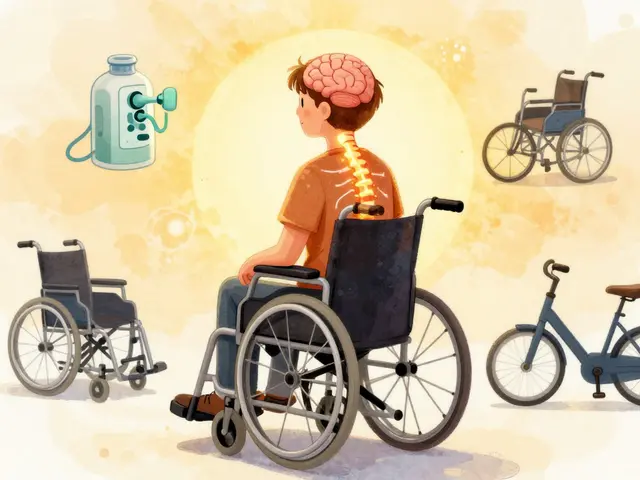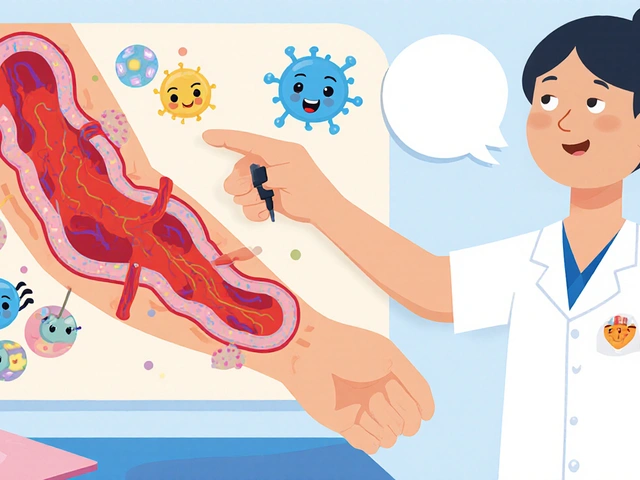Side Effect: Spot Risks, Read the Label, Take Action
Side effects are simply unwanted reactions a medicine can cause. Some are mild—like drowsiness or upset stomach—and some need urgent care, like trouble breathing or fainting. Knowing what to expect and what to ignore helps you use medicines safely and avoid surprises.
Start every new drug by reading the brief leaflet or online monograph. Look for common problems, serious warnings, and interactions. If you take more than one medication, check how they combine. For example, some antibiotics or heart drugs can worsen other medicines' effects—so a quick check can prevent big trouble.
How to read side-effect info fast
Focus on three things: frequency (how often it happens), severity (how bad it gets), and onset (when it starts). If a side effect is rare but severe, the leaflet will highlight emergency signs. If it's common and minor, expect it early and it may fade. Pay attention to sections labeled "warnings," "contraindications," and "drug interactions." Those tell you when NOT to take a drug.
Use reliable resources. Our site has clear articles that explain both common and rare reactions for many meds—like Reminyl (galantamine), Ativan, Zithromax, and more. Those pages break down what to watch for, real-world tips, and when to call a doctor. If anything feels off, don't wait to check a trustworthy source or call a pharmacist.
Quick safety checklist
1) Keep a list of every medicine, supplement, and herbal product you use. 2) Note any new symptoms after starting a drug and how soon they appeared. 3) Avoid mixing alcohol with medicines unless your doctor OKs it. 4) Ask about interactions if your provider adds a new drug. 5) Use the lowest effective dose for the shortest time needed.
Some side effects need fast action. Seek immediate care if you have chest pain, severe shortness of breath, sudden weakness, severe rash, or signs of allergic reaction (swelling, hives, throat tightness). For non-emergency reactions—like constipation, sleep changes, mild nausea—call your prescriber for advice before stopping the medication abruptly.
Not every symptom is a side effect. Stress, diet, and other illnesses can cause similar issues. A simple trick: if a symptom started right after a new medication, treat it as suspect and ask a pro. If stopping a drug, do it under medical guidance, especially for medications that can cause withdrawal.
Want specific examples? Our tag page collects detailed posts on side effects for many common drugs and supplements. Read the ones that match your meds, check interaction notes, and follow the practical tips—they often save time and prevent harm. If in doubt, call your pharmacist; they’re good at quick interaction checks and clear advice.
13
Atenolol and Swallowing Difficulties: Is It a Side Effect?
I recently came across some information regarding Atenolol, a commonly prescribed medication for high blood pressure, and its potential link to swallowing difficulties. It got me thinking, could this be a side effect that many are unaware of? After doing some research, it seems that swallowing difficulties are not listed as a common side effect of Atenolol, but some cases have been reported. It's important to monitor any changes in your health while taking medication and communicate with your healthcare provider. If you or someone you know is experiencing swallowing difficulties while on Atenolol, it may be worth discussing with a medical professional.
Latest Posts
Popular Posts
-
 Magnesium Supplements and Osteoporosis Medications: What You Need to Know About Timing
Magnesium Supplements and Osteoporosis Medications: What You Need to Know About Timing
-
 Spinal Cord Injury: Understanding Function Loss, Rehabilitation, and Assistive Devices
Spinal Cord Injury: Understanding Function Loss, Rehabilitation, and Assistive Devices
-
 OTC Heartburn Medications: Antacids, H2 Blockers & PPIs Explained
OTC Heartburn Medications: Antacids, H2 Blockers & PPIs Explained
-
 Celiac Disease: Gluten-Free Living and Nutrient Supplementation
Celiac Disease: Gluten-Free Living and Nutrient Supplementation
-
 Meniere’s Diet: How Sodium Restriction and Fluid Balance Reduce Vertigo and Hearing Loss
Meniere’s Diet: How Sodium Restriction and Fluid Balance Reduce Vertigo and Hearing Loss



